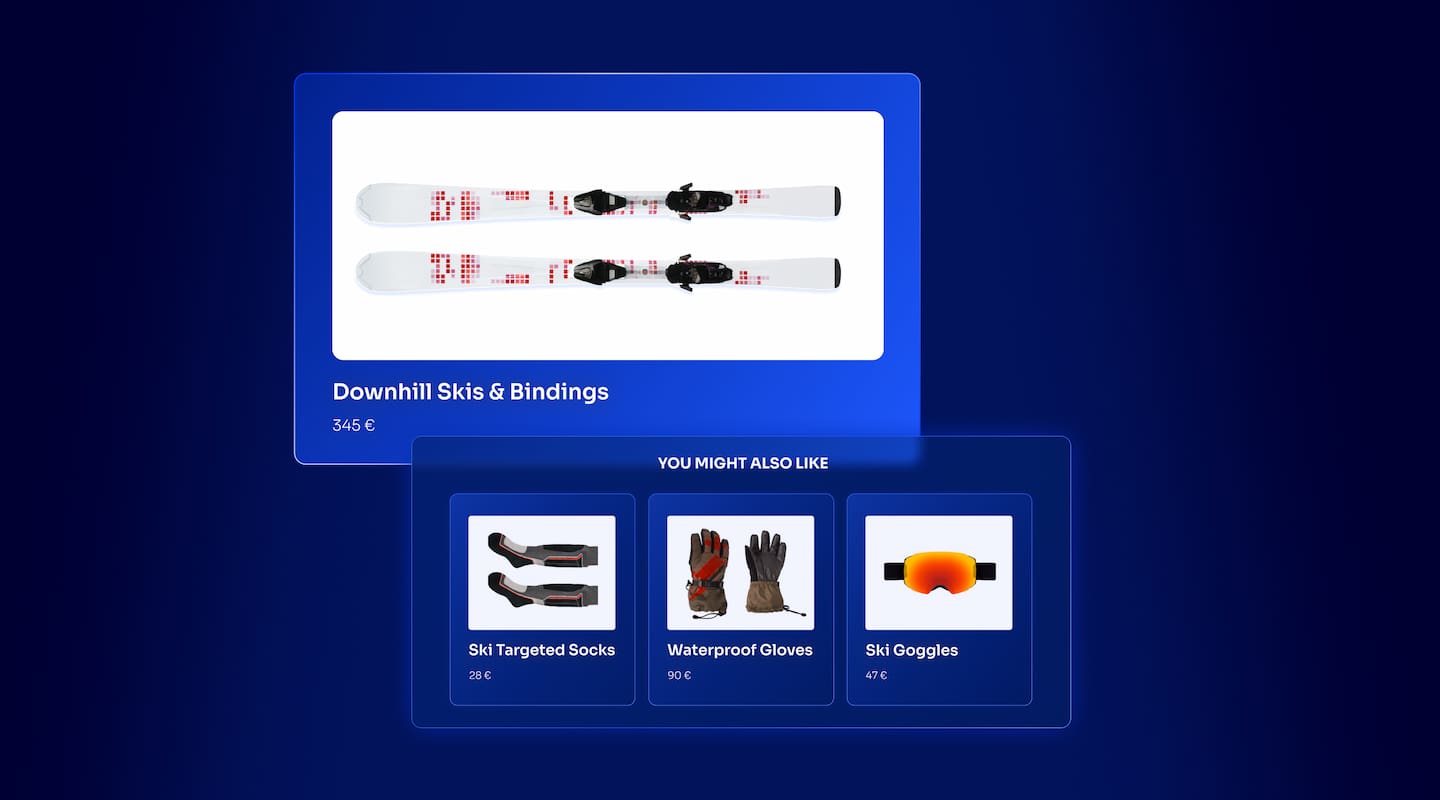Add InstantSearch and Autocomplete to your search experience in just 5 minutes
A good starting point for building a comprehensive search experience is a straightforward app template. When crafting your application’s ...
Senior Product Manager


A good starting point for building a comprehensive search experience is a straightforward app template. When crafting your application’s ...
Senior Product Manager

The inviting ecommerce website template that balances bright colors with plenty of white space. The stylized fonts for the headers ...
Search and Discovery writer

Imagine an online shopping experience designed to reflect your unique consumer needs and preferences — a digital world shaped completely around ...
Senior Digital Marketing Manager, SEO

Winter is here for those in the northern hemisphere, with thoughts drifting toward cozy blankets and mulled wine. But before ...
Sr. Developer Relations Engineer

What if there were a way to persuade shoppers who find your ecommerce site, ultimately making it to a product ...
Senior Digital Marketing Manager, SEO

This year a bunch of our engineers from our Sydney office attended GopherCon AU at University of Technology, Sydney, in ...
David Howden &
James Kozianski

Second only to personalization, conversational commerce has been a hot topic of conversation (pun intended) amongst retailers for the better ...
Principal, Klein4Retail

Algolia’s Recommend complements site search and discovery. As customers browse or search your site, dynamic recommendations encourage customers to ...
Frontend Engineer

Winter is coming, along with a bunch of houseguests. You want to replace your battered old sofa — after all, the ...
Search and Discovery writer

Search is a very complex problem Search is a complex problem that is hard to customize to a particular use ...
Co-founder & former CTO at Algolia

2%. That’s the average conversion rate for an online store. Unless you’re performing at Amazon’s promoted products ...
Senior Digital Marketing Manager, SEO

What’s a vector database? And how different is it than a regular-old traditional relational database? If you’re ...
Search and Discovery writer

How do you measure the success of a new feature? How do you test the impact? There are different ways ...
Senior Software Engineer

Algolia's advanced search capabilities pair seamlessly with iOS or Android Apps when using FlutterFlow. App development and search design ...
Sr. Developer Relations Engineer

In the midst of the Black Friday shopping frenzy, Algolia soared to new heights, setting new records and delivering an ...
Chief Executive Officer and Board Member at Algolia

When was your last online shopping trip, and how did it go? For consumers, it’s becoming arguably tougher to ...
Senior Digital Marketing Manager, SEO

Have you put your blood, sweat, and tears into perfecting your online store, only to see your conversion rates stuck ...
Senior Digital Marketing Manager, SEO

“Hello, how can I help you today?” This has to be the most tired, but nevertheless tried-and-true ...
Search and Discovery writer
Imagine that you’re in a mall for the first time and suddenly have a craving for pizza, and it must be vegan. How do you deal with that? Ask a random person where the food court is? Go to each food vendor and see if they have vegan pizza on display?
Probably not. You take out your phone, right?
Of course. But what’s interesting is what you might do next.
It’s become increasingly common for people to skip entering search terms in their search bar and instead use their smartphone (or other device) as a virtual assistant to do a quick voice search (especially if you’re hungry?). You hear smartphone users saying voice commands in natural language, like (to Apple’s Siri) “Where can I get vegan pizza around here?” Or “OK Google, where’s the best vegan pizza near me?” And whether they are using a mobile app voice search feature with their phone on the go or querying from their living room with their Amazon Echo smart speaker, this trend is going mainstream.
So, it follows that for businesses intent on success, voice search optimization for SEO (search engine optimization) is a necessity. SEO professionals, marketing managers, and content creators alike must rethink how they optimize their ecommerce websites, marketing campaigns, and content to reflect the growing emphasis on voice search technology.
To help you improve your business’s voice search results, let’s explore how, who, when, where, and why you need to start incorporating words like how, who, when, where, and why in your content and keywords. Because using those question words is one of the ways to implement successful voice search optimization.
More people are becoming comfortable with talking at, with, and to their phones rather than talking to other people on their phones. This trend reaches far wider than voice search alone, especially among the younger generations. One-direction types of speaking, such as vlogging, voice notes, TikTok, and Instagram Reels, are popular nowadays. It’s common to speak into a phone without expecting a human to respond. But crucially, it’s not just the younger generations that are embracing virtual assistants and voice search, it’s everyone.
A few statistics that illustrate this phenomenon:
Research from Gartner suggests that the COVID-19 pandemic may also have played a role in driving up the number of voice searches. For starters, people stuck indoors may have had Amazon Alexa as their only (or preferred?) company. Also, when out in public, people felt less inclined to get out their phones and touch their screens if they could instead just talk hands free into their headset microphone and get an answer from Siri, Alexa, or Cortana.
So voice search, whether it’s done using a mobile phone or through a digital assistant, is transforming how people find what they need. And companies are turning to voice search optimization to meet the growing demand and make sure their customers can complete successful searches.
What do you need to do to optimize your voice search apps? How can you make your voice search online perfect? How can you nail your local voice search SEO targets?
There are three main areas when determining an SEO strategy for voice search optimization: keywords and tone, website content, and opportunities for perfecting local searches.
If you think about how people use voice search — in particular, how they might frame their search query — you’ll notice some differences compared with doing a traditional online search.
Let’s imagine that a woman is going to the Lincoln Memorial at 3 p.m. and wants to know what the weather will be like. Using a typed Google search, she might frame her query as “Weather Washington DC”, and quickly get the afternoon weather report.
If she sought the same information using Google voice search, she’d most likely express it as “What’s the weather forecast for Washington D.C. this afternoon?” Or “Will it rain in Washington D.C. today?” Or maybe “Siri, will I need an umbrella?”
A typical voice search:
It’s also worth noting that in a voice search, the speaker may assume some contextual understanding. For instance, if they want to research products and where they can buy them locally, they might assume that their location is known and not include this detail in their voice query.
These parameters offer some tips for voice search optimization. You should use long-tail keywords in the form of questions. This means using those question words — How, Who, When, Where, and Why — at the start of strings. Also, use a conversational tone in all content, including keywords, and include filler words such as the, of the, to, and for.
How you structure content on your website is crucial to people’s voice-search success. Here are several factors to consider.
Target “rich” answers
Rich answers (or “rich results”) are the snippets of information that appear right above the search results. These results are extracted from high-ranking website content. They answer questions in what Google considers a comprehensive way.
Because voice search users expect a speedy response, it is rich answers — including featured snippets, knowledge graphs, knowledge panels, and knowledge boxes — that are surfaced. For voice search optimization, you need to create web content that could be candidate material for excellent rich answers.
This can be a challenge, but you can often achieve it by using a question that contains a longtail keyword as the header for a blog post or web page. The text that follows should be a short, succinct, and direct answer to the question you’ve asked.
Include frequently asked questions (FAQs)
Another effective practice is adding an FAQ page, or perhaps a few applicable FAQs at the bottom of a page. This works well because FAQ structure is a common question followed by a quick answer.
Optimize your website for mobile users
Because voice search is happening mostly on mobile devices, it is essential that your web pages be optimized for mobile.
Improve your site page speed
Because answers to voice search queries are needed at lightning speed, fast website page loading is needed for appealing to the algorithm.
The majority of mobile voice search queries revolve around information about local places and conditions (like where to find that vegan pizza). Voice search related to local areas is not applicable for every type of business, but for hospitality and retail local businesses, it should be considered a key part of your marketing strategy.
This concludes our discussion of voice search optimization strategy; hope you found these tips useful.
With Algolia’s powerful search API, you can anticipate what your voice searchers want, prepare your localized content so search engines can easily give it to people using phones, and, in general, provide an experience that delights your users.
At Algolia, we help companies apply voice search best practices to optimize every aspect of internal voice search for their websites and apps. For instance, here’s how we helped WeightWatchers implement voice search to improve its wellness app.
We’re ready to help you build a personalized mobile search experience to elevate your brand. You can add voice search to your mobile search experience with native browser speech-to-text support.
Check out our webinars on how to build a great voice search experience and use voice search in retail, then contact us so we can get you started!
Powered by Algolia Recommend